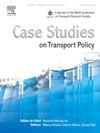Influential analysis of smart transportation policy on common prosperity using casual mediation effect inference
IF 3.3
Q3 TRANSPORTATION
引用次数: 0
Abstract
Nowadays, China is advancing the smart transportation policy which was initially implemented in 2018. It aims at leveraging advantages of transportation infrastructures as a pillar industry to drive high-quality economic development, as well as common prosperity. In this context, this work focuses on effect mechanism investigation of smart transportation policy on common prosperity. Using the data collected from 31 provinces of China mainland, systematic empirical analysis is conducted using casual mediation effect inference. The main results demonstrate that implementation of smart transportation policy enhances regional common prosperity by 2.8%. It comprises a direct effect of 1.2% and a cumulative indirect effect of 1.6%. The indirect effect is a chain-mediated transmission mechanism from primary distribution to secondary and tertiary distributions. The mediation effect accounts for 57.14% of the total effect. In addition, the coefficient of the “social sharing index” in common prosperity (2.8%) is greater than the coefficient of the “development index” (2.4%). This indicates that effect of smart transportation policy on social sharing is significantly stronger than that on economic development. Accordingly, five aspects of policy recommendations are put forward from results, in order to maximize supporting role of smart transportation on common prosperity. This paper innovatively constructs a three-layer chain intermediary mechanism theory from the perspective of economic development and social sharing. It provides theoretical support and practical path for smart transportation system to drive common prosperity, and provides a new paradigm of transportation governance for cracking the regional imbalance.
基于随机中介效应推理的智慧交通政策对共同富裕的影响分析
目前,中国正在推进智能交通政策,该政策于2018年初步实施。以交通基础设施为支柱产业,带动经济高质量发展,促进共同繁荣。在此背景下,本文重点研究智慧交通政策对共同富裕的作用机制。利用中国大陆31个省份的数据,采用随机中介效应推理进行系统实证分析。主要结果表明,智能交通政策的实施使区域共同繁荣提高了2.8%。它包括1.2%的直接影响和1.6%的累积间接影响。间接效应是由一级分布到二级和三级分布的链式传导机制。中介效应占总效应的57.14%。此外,共同富裕中的“社会共享指数”系数(2.8%)大于“发展指数”系数(2.4%)。这表明智慧交通政策对社会共享的影响明显强于对经济发展的影响。据此,从结果出发,提出了五个方面的政策建议,以最大限度地发挥智慧交通对共同繁荣的支撑作用。本文创新性地从经济发展和社会共享的角度构建了三层链中介机制理论。为智慧交通系统推动共同繁荣提供理论支撑和实践路径,为破解区域失衡提供交通治理新范式。
本文章由计算机程序翻译,如有差异,请以英文原文为准。
求助全文
约1分钟内获得全文
求助全文

 求助内容:
求助内容: 应助结果提醒方式:
应助结果提醒方式:


